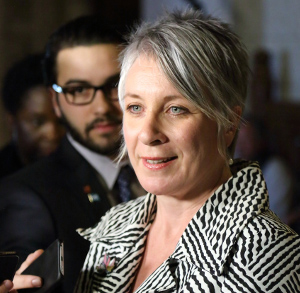
When Patty Hajdu took over as minister responsible for the Status of Women last fall, she noticed something odd about the speeches her staff were preparing for her: they all depended on American violence against women statistics.
“The last comprehensive survey of women’s experience with violence that was conducted by the federal government was in 1992,” said Hajdu, who ran a homeless shelter in Thunder Bay, Ontario, prior to becoming a Liberal government cabinet member in late 2015.
While individual provinces have conducted research and launched their own initiatives, there has been little movement nationally to address what Hajdu calls gender-based violence.
The Liberal government has pledged to change this, however, by launching Canada’s first-ever national strategy against gender-based violence by early 2017.
“We believe that a federal strategy has to come about right now,” Hajdu said. “There are a number of things that we do as a federal government already on gender-based violence, and the challenge is that there’s not a lot of coordination, there’s not much communication across government, and there certainly isn’t a focus on data.”
But before any strategy is unveiled, Hajdu wants to get a handle on what violence against women, girls, and people in the LGBTQ2S+ community looks like in Canada today.
The government’s strategy for collecting that information won’t involve a mass Statistics Canada survey. Instead, Hajdu is spending her summer hopping from one big roundtable discussion to the next, talking to survivors, the non-profits who work with them, academics, community leaders, business owners, and the legal community. They’re keeping the list of attendees under wraps, however, as confidentiality is part of the roundtable set-up.
“It’s very difficult to know what we need to do as a country if we don’t know to what extent the problem exists and what kinds of violence women are experiencing. But the other data that we need is data on spending that we already contribute to [solving] this problem,” she said.
Sex workers and advocates included
Earlier this week Hajdu was in Toronto, where cyber-bullying and online harassment were major topics. She arrived in Vancouver yesterday, and flies to Regina tonight, with more cities to follow.
There isn’t enough money to visit every major city, or even every province, Hajdu said, adding Halifax is as far east as her team will go. However, Status of Women promises an online survey is forthcoming, and in the meantime it’s accepting comments and suggestions for the strategy via email.
“What we’re trying to do is thoughtfully include all the different players that might have experience or research or a voice in this issue,” she said.
That includes representatives from indigenous communities. But a national strategy on ending gender-based violence is separate from the promised inquiry into missing and murdered indigenous women, the start date of which has yet to be announced.
“We will of course be watching the results of the inquiry and know there will be quite a bit of synergy between the inquiry and the federal strategy,” Hajdu said.
The roundtable discussions will also include sex workers and the non-profits that advocate for them.
It’s been two and a half years since the Supreme Court of Canada struck down laws against living on the avails of prostitution and soliciting sex, citing safety concerns for sex workers – mostly women. And it’s been a year and a half since the previous Conservative government introduced Bill C-36, the Protection of Communities and Exploited Persons Act, making it legal to sell sex, but criminalized buying, advertising, or supporting sex work in any way.
The law has been criticized by sex workers and their advocates, as well as the Canadian Bar Association, for keeping sex work unsafe. Justice Minister Jody Wilson-Raybould has been tasked with reviewing C-36 as part of her mandate.
Hajdu says she’ll feed all the information she receives from sex workers back to Wilson-Raybould, but wouldn’t comment on when the justice minister will present the results of her review. ![]()
Read more: Politics, Gender + Sexuality















Tyee Commenting Guidelines
Comments that violate guidelines risk being deleted, and violations may result in a temporary or permanent user ban. Maintain the spirit of good conversation to stay in the discussion.
*Please note The Tyee is not a forum for spreading misinformation about COVID-19, denying its existence or minimizing its risk to public health.
Do:
Do not: